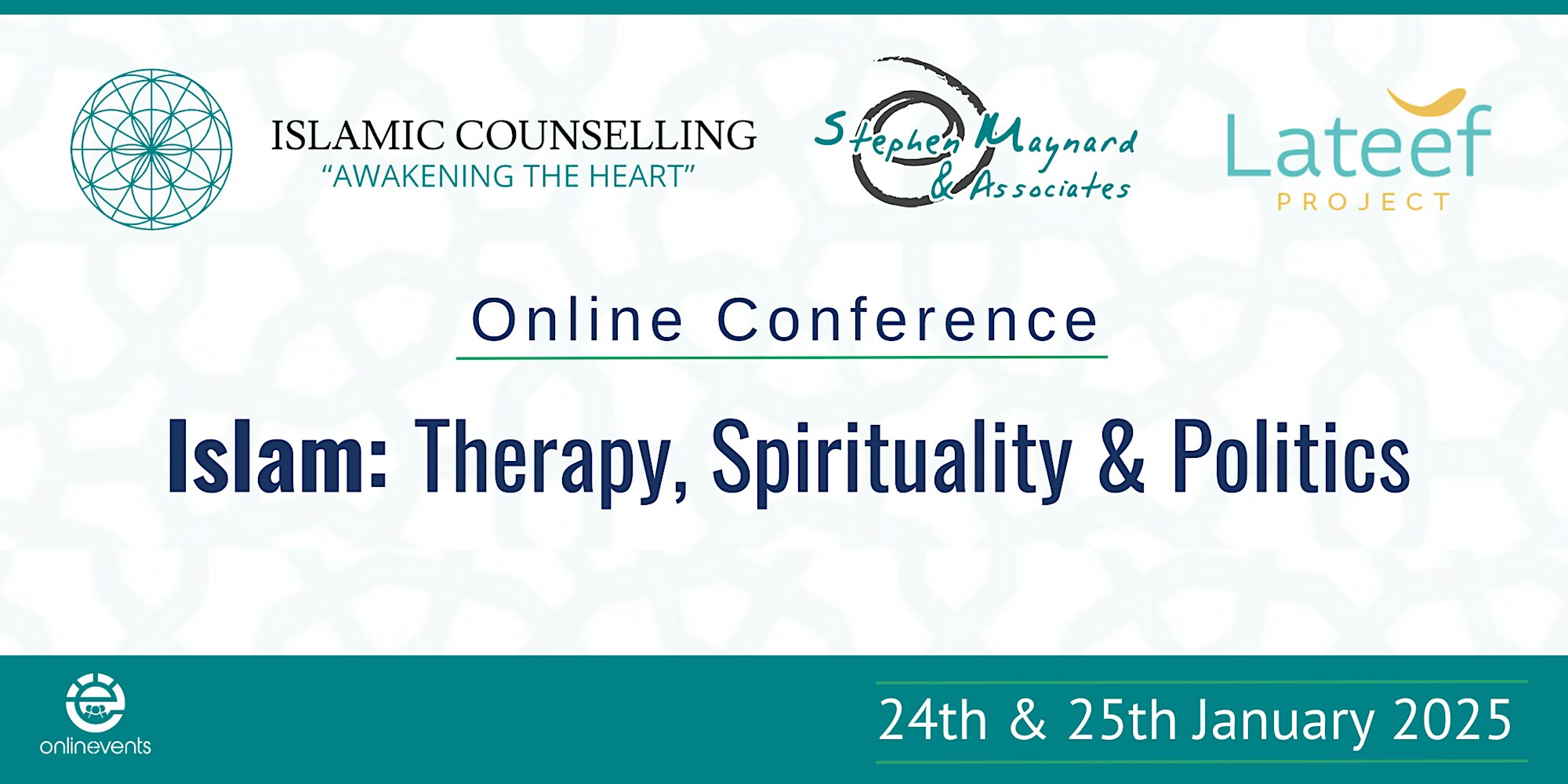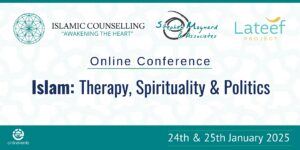About this event



DOWNLOAD YOUR PROGRAMME HERE
A conference that centres a different way of being
All are welcome to this conference, which aims to offer therapists from our diverse communities an opportunity to reflect and dialogue on ancient and contemporary Islamic understandings of self, therapy, and well-being. Our worlds are structured by our imaginings of it, and this conference explores Islamic understandings of knowing, being, and health, that may invite a wider understanding of the field of mental health as a whole.
Exploring intersections between spirituality therapy and politics
This is also important within the context of today’s political and geopolitical upheavals as we try to build therapeutic relationships with Muslim clients whose lives are structured by understandings of Islam. It is widely acknowledged that therapy is not neutral, and perhaps this is why Muslims in the Global North do not access standard therapeutic practice as often, as quickly or effectively as many other client groups.
Coming together
This event is a space for both Muslim therapists and their peers to reflect on the nuances of therapeutic work in the super-diverse Muslim community—a community that has often been subject to misunderstanding, suspicion, and surveillance. We will explore how Islam, Islamic Counselling, and Islamic Psychology, provide pathways to more culturally aligned and meaningful therapeutic experiences for Muslims. With keynote speakers, and practical examples of therapeutic work, we aim to provide valuable learning for Muslims and non-Muslims alike.
Join Us
Join us as we explore the vital role that therapy, spirituality, and activism play in nurturing resilience, well-being, and social justice amid current challenges. This is more than a conference—it is a gathering of hearts and minds committed to fostering deeper understanding and meaningful change in our field.
Islam and Therapy: Gathering for Muslim Therapists & Students
(Sat, 25 Jan 2025 16:00 – 19:00 GMT)
As part of the conference, we warmly invite Muslim conference participants to share our experiences, gain support from each other, and consider any emergent themes and actions arising from the conference.
Please note, you will need to book separately for this meeting. Click on this link to find out more and book. REGISTRATION LINK
TICKETS
Choose your ticket price. Each ticket provides access to the LIVE event on Zoom & the conference Recording. Choose the fee that works for you: £25.00, £37.50, or £50.00.
CPD CERTIFICATE
After attending the LIVE conference, your CPD certificate will be emailed to you.
If you watch the event on catch-up, you can download your certificate from the Onlinevents CPD Library.
RECORDING
This conference will be recorded and the recordings are included in the live admission tickets. This will be useful for colleagues who are not able to attend the event live and also for those who attend the event live and want to watch it again.
ZOOM
This workshop will be hosted on the Zoom meeting platform where we will use our cameras and microphones to interact with each other as a group.
___________________________
All the colleagues at ONLINEVENTS and the presenters we collaborate with are committed to working in a manner consistent with the BACP Ethical Framework, which can be accessed on the link below. When registering for this event you are agreeing to be present and interact in a manner that is consistent with this Framework.
SPEAKERS

Islamic Humanism: A Resource for Mental Health Practitioners – Robert K. Beshara, Ph.D., M.F.A.
About this presentation:
Ibn Rushd (Averroes), a pivotal figure in Islamic philosophy, offers invaluable insights into the integration of reason and faith, making his works a significant resource for mental health practitioners. This paper explores how Ibn Rushd’s philosophy, rooted in Islamic humanism, can inform culturally and spiritually sensitive mental health practices. Central to his thought is the harmonization of rational inquiry and spiritual understanding, which provides a holistic approach to mental well-being.
___________________________________________________

Healing Across Borders: Breaking Cycles, Reclaiming Voices – Ramzia Akbari Noor
About this presentation:
Centred on the principles of liberation, cultural reclamation and collective healing, this presentation attempts to explore decolonial approaches to therapeutic care for refugees and displaced communities and invites participants to critically evaluate the enduring impacts of colonialism and systemic oppression on refugee experiences, highlighting how these forces shape trauma, identity, and access to healing.
Drawing on decolonial theory, community-based practices, and lived refugee experiences, the presentation seeks to explore the power of reclaiming cultural and spiritual narratives, traditions, and voices as central to healing and empowerment. By centring refugee agency and honouring their resilience, this approach challenges traditional mental health frameworks and invites a shift toward more inclusive, equitable, and culturally responsive care.
___________________________________________________

Gender-Based Violence: Othering the Other – Waheeda Islam
About this presentation:
Through an exploration that integrates spiritual, political, and therapeutic perspectives, this presentation advocates for a nuanced and decolonised approach to addressing gender-based violence within the mental health field, while challenging the colonial structures that perpetuate both violence and othering. Drawing on experience of working in the Violence Against Women and Girls (VAWG) sector in the global north, this presentation examines how gender-based violence is politicised, particularly in relation to Muslim communities and other minoritised groups, highlighting the selective outrage that exists when it comes to experiences of VAWG in global majority communities.
Special attention will be given to the challenges faced by Muslim mental health professionals and organisations working in the VAWG sector in the global north, and in the current climate of Islamophobia. This will be followed by an exploration of how Islamic spiritual perspectives can contribute to trauma-informed approaches to healing and justice, and how an Islamic faith-based approach to mental health is intrinsically intertwined with activism, anti-oppressive practices and social justice.
___________________________________________________

Perspectives on the Personal, the Political, the Spiritual and the Psychological – Sarah Huxtable Mohr
About this presentation:
In a brief interview format, this is an opportunity to speak about the way the personal, the political, the spiritual and the psychological are connected for us individually, and for the work in mental health. Looking back over a 30 year journey from mental illness to being a licensed social worker, there will be comments on the intersections between different types of awareness, including God-consciousness. There will be time spent exploring questions about what mental health actually is, for us individually, and for us societally drawing on the work of liberation psychologist Ignacio Martín-Baró. Participation will be welcomed.
___________________________________________________

Manifestation and Spiritually Integrated Treatment of OCD Scrupulosity (Waswasa) in Muslim Patients – Hooman Keshavarzi
About this presentation:
The expressions of the symptoms of Obsessive Compulsive Disorder vary according to the socio-psychological context of patients. In religiously observant populations, OCD symptoms can interact with religious beliefs and practices, known as OCD scrupulosity. The literature is replete with discussions of OCD scrupulosity for Jews and Christian, but minimal research is available on its interaction with Islamic belief in Muslim populations. This paper details some of the most common manifestations of OCD scrupulosity known as waswasa in Muslim populations, thematically categorized based upon the attention afforded to its typical expressions in classical Islamic legal manuals.
These broader thematic clusters of symptoms can be divided into four sections, (i) ritual purity and prayer, (ii) marriage and divorce, (iii) blasphemy and apostasy, and (iv) intrusive thoughts of sin. Additionally, assessment methods and identification of OCD symptomology as indicators of clinical psychopathology are discussed. Accompanying this, is an overview of the potential religious dispensations afforded to OCD patients in Islamic ritual law as disability accommodations. The role and conceptualization of waswasa according to normative Islamic belief is presented based upon the Qur’an, prophetic traditions and Islamic scholarly writings.
To follow, an Islamically integrated approach to cognitive psychotherapy and exposure response prevention therapy (ERP) is offered, drawing from traditional Islamic faith based healing. Interventions are rooted in a published model of treatment known as Traditional Islamically Integrated Psychotherapy (TIIP). The model proposes a need to counterbalance the OCD patient’s negative attribution bias and accompanying compulsive behaviors that are indicators of excessive fear with a more self-compassionate cognitive orientation. Interventions include a cognitive restructuring component using cognitive techniques of: challenging the evidence, correction of faulty Islamic beliefs through psychoeducation, acceptance of intrusive
___________________________________________________

The Personal and Political in Therapy: Navigating Identity, Spirituality, and Systemic Change as an Anti-Oppressive Practitioner – Myira Khan
About this presentation:
This presentation will explore the intricate intersections of identity, spirituality, and politics in anti-oppressive therapeutic practice. It delves into the challenges and opportunities of working as a Muslim counsellor within mainstream settings, highlighting the importance of bringing one’s whole self—cultural, spiritual, and political—into the work. The session examines how therapy as a profession responds to political contexts, and how as a practitioner I can work both in the profession, by supporting clients and supervisees, and on the profession, by advocating for systemic change towards embedded anti-oppressive practice across all levels and areas of the profession.
___________________________________________________

A Critique of Muslim Mental Health – Dr Tarek Younis
About this presentation:
Mental health is positioned as the cure-all for society’s problems, from pandemics to terrorism. But psychology and psychiatry are not apolitical, and neither are Muslims. This talk explores how Islamophobia works and unpacks where the politics of the psy-disciplines and the politics of Muslims overlaps, especially as it relates to the Muslim mental health movement. We’ll discuss how psychological theories and practices serve State interests and maintains racism and Islamophobia. Especially in times of genocide, this talk will underline how psychology necessarily serves the State in the production of loyal, low-risk and productive Muslim citizens.
___________________________________________________
CONFERENCE HOSTS

Sabnum Dharamsi is a psychotherapist, and writer. She co-founded the IslamicCounselling Model, developing an accredited training curriculum and practice based on sacred, timeless ways of seeing and being.
Stephen Abdullah Maynard has a history of working with diversity and counselling/psychotherapy. He became a counsellor in 1984. In 1990 he set up one of the first UK training programmes in transcultural counselling. In 1996 Sabnum Dharamsi and he developed the therapeutic model Islamic Counselling. Abdullah went on to set up The Lateef Project, which since 2010 has provided free Islamic counselling in the belief that people in England should access appropriate mental health care, free at the point of use. Through The Lateef Project, Abdullah is working towards the accessibility of appropriate faith-based and effective mental health care for Muslims in the UK.
Frequently Asked Questions (FAQs)
Does my ticket include access to the conference recording?
- Yes, your ticket includes access to the conference recording! After the event, the recording will be uploaded to the Onlinevents Learning Library, so you can watch it on catch-up at your convenience.
Will I be sent a CPD Certificate for attendance?
- Yes, you will receive a CPD certificate! After the conference, you will receive an email with instructions on how to access your certificate for your records.
How do I contact the conference organisers?
- Please email he**@************co.uk, so that Onlinevents support team can get back to you as soon as possible.



